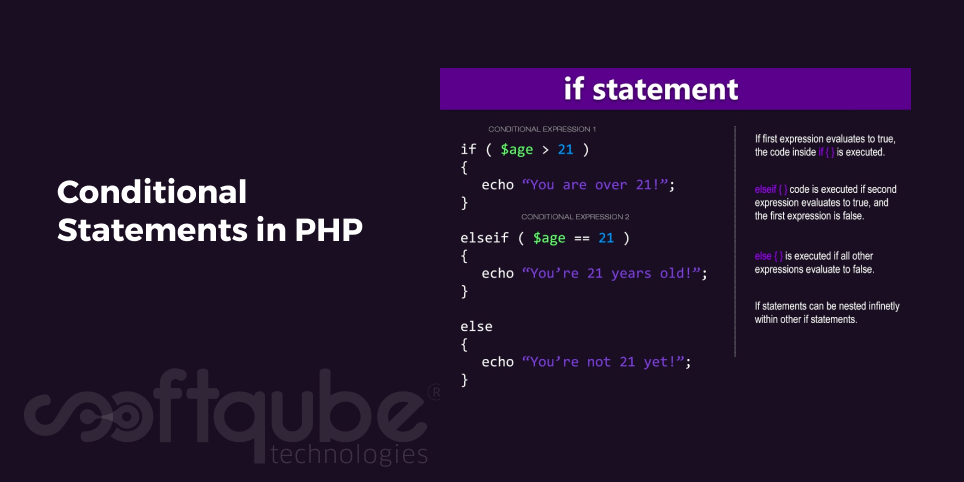Conditional Statements in PHP
September 5, 2015

We keep discussing about PHP, its uses and draw backs, its popularity and all. Today, this blog post from Softqube Technologies, PHP development Company India will serve as a guide for those who face difficulty in working with conditional statements in PHP.
Today, we will discuss about how conditional statements can be used? Well, first of all let us know what a conditional statement is?
Meaning of Conditional Statement:
A group of programming features which are available in every programming language are known as conditional statements. One of the well known example of such statement is the “if” statement. We have various conditional statements in PHP however it entirely depends on the decision of the programmer to know which approach suits best the situation.
Use of Conditional Statement:
Such statements help the programme to decide what route one must take keeping in mind the evaluation of the condition. These have only two values either “true” or “false”.
How to develop these statements?
Two basic concepts can be used to create conditions. One concept is that the condition can either return any of the two values: True or False. Second concept is till the time a thing has a value, it can be used as condition.
Comparison Operators:
These are used to compare two values with one another. Conditional statements entirely depend on such operators as these serve as a base for developing the conditions. There are enormous types of operators available in PHP and these are as follows:
- Equal operator
- Identical operator
- Not identical operator
- Less than
- Greater than
- Less than or equal to
- Greater than or equal to
Conditional Statements in PHP:
PHP has several types of conditional statements like as if, else, elseif and switch. Here we will learn about each one of them:
- If Statement: This is the basic statement of many of the programming and scripting languages and PHP is one of them. With this statement, developers can create simple control structures.
Codes can be processed only if there’s one expression that is to be executed. If statements can be enclosed within other if statements and these enclosed statements offer complete flexibility for achieving conditional execution of several code paths of the scripts.
- Else statement: The else statement enhances if statement as the else statement cannot influence the comparison statement. This can only be used in combination with if statement.
In this if/else structure, ternary operator is used. This is useful while writing an if/else statement that allocates a value to the variable.
Ternary operator structure: $foo = ([conditional expression])?[value if true] : [value if false];
- Else if Statement: This also expands the else statement so it can offer comparison expression. If the elseif condition is true then it will perform the tasks mentioned inside the curly brackets. IF statement can contain unlimited else if statements.
- Switch Statement: This is used to check variable across many different values. Switch statements can be rewritten as various if statements. This examines the value of $username and then offers $rank based on its value.
These statements can have multiple cases allocated to the same code block.
Wind Up
Hence, here we have covered all the basic conditional statements that are used in PHP. In a nutshell, we learnt about basic PHP operators as well as four main conditional statements.
If you need some more guidance about the same then get in touch with our expert PHP developers.
Share on







